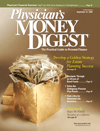Publication
Article
Physician's Money Digest
Dodge Costly Estate Planning Mistakes
Author(s):
In today's complex estate planning environment,physicians often need more than just the basiclegal documents to achieve their planning objectives.Focusing on saving estate taxes should be amajor priority. Hundreds of thousands of dollars can belost to Uncle Sam unless an estate plan is implementedand consistently monitored. Still, if you cover the basics,many of the potential costly perils can be avoided.
Ramp up Your Plans
The first step to avoiding many of these costly perilsis to pound out procrastination. If you don't have a will,it's time to develop a plan to distribute your property inthe event of your death. Die without one, and yourstate's intestacy laws will determine how your estate isdivided. State laws differ on the percentage of the estatethat automatically goes to surviving family members.Also, this manner of distribution doesn't consider theindividual needs of the heirs or characteristics of theassets involved. Dying without a will is an open invitationto unnecessary taxes, hassles, and expenses foremotionally stressed family members.
Reviewing your current will is the next logicalstep. If your will hasn't been reviewed in the past 3years, or if your objectives have changed, then it'stime for a checkup. An existing will can be amendedor modified with a codicil. In certain cases, it's best tohave a new will drafted to cover provisions that entitleyour spouse to get the unlimited marital deduction,and to include language that will reduce or avoid thecomplexities of generation-skipping taxes.
Making your will a tax-wise will is a fairly simpleprocess for married couples who want to transfer themaximum exclusion in property (at the second spouse'sdeath) with no federal estate tax. In 2004 and 2005, theexclusion amount has increased to $1.5 million per UScitizen and $3 million for couples. The unlimited maritaldeduction allows the surviving spouse to receive anyamount of property with no federal estate tax due. Butat the second spouse's death, the estate can be subject tothe maximum tax rate if the gross estate is over the $3million exclusion amount. For the will to save on taxes,each spouse should own up to their individual exclusionamount in property. At the first spouse's death, up to$1.5 million in property can be placed in a bypass trustto avoid being taxed in the surviving spouse's estate. Atax-wise will, combined with proper title to property,will allow each spouse to take full advantage of theexemptions, with reduced or zero federal estate tax.
Trust in Insurance
Consider using life insurance trusts as a method toreduce the value of your estate. Life insurance deathbenefits are free from income tax, but they are used inyour estate tax calculations if you retain any incidentsof ownership. Life insurance trusts are designed tosave on estate taxes, but be sure you are comfortablewith the terms and provisions of the trust. Insurancepolicies transferred to a trust will be out of your estateif you live 3 years after the date of the transfer.Therefore, be certain that your trustee knows to makethe trust the owner and beneficiary of the policy. Oncethe trust becomes operative, it can't be changed.
Verifying beneficiaries can also help you avoid estatetax perils. Retirement plans, annuities, and life insurancepolicies pay death benefits to the person or entityyou list as a beneficiary. Get computer-generated statementsfrom the insurance company or retirement planthat list the primary and contingent beneficiaries.Mistakes are very common, and include listing minorchildren, a former spouse, a trust established under anold will that is no longer valid, or a person who doesn'thave experience managing money. Each beneficiary designationshould be consistent with your overall plan.
William B. Howard, Jr, is president of William
Howard & Co Financial Advisors, Inc, a fee-only
investment and financial planning firm in Memphis,
Tenn. He has 23 years of experience working
with physicians and was named one of the top 150
advisors. He welcomes questions or comments at
901-761-5068 or whoward@whcfa.com.
